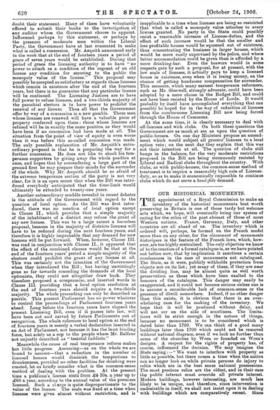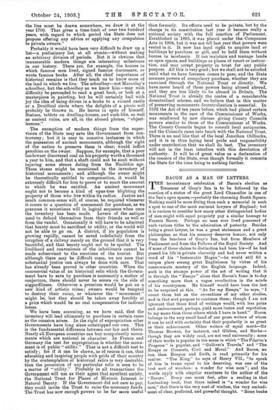OUR HISTORICAL MONUMENTS. T HE appointment of a Royal Commission to
make an inventory of the historical monuments best worth preserving in Britain is one of those tardy but welcome acts which, we hope, will eventually bring our system of caring for the relics of the past abreast of those of most Western nations. France, Germany, Italy, and other countries are all ahead of us. The inventory which is ordered- will, perhaps, be formed on the French model more than on any other, for the classement of monuments historiques is the feature of the French laws, which, how- ever, are too highly centralised.. The only objection we know of to the creation of a formal catalogue is, as we have pointed out before now, that by implication it sanctions a certain carelessness in the case of monuments not catalogued. The State, as it were, publicly withholds protection from objects not on its list; yet many of these, if they are near the dividing line, may be almost quite as well worth preservation as those which have been exalted to the honours of the catalogue. This danger may easily be exaggerated, and it could not become serious unless one is to assume a considerable lack of common-sense or the presence of illwill somewhere. Indeed, if no other danger than this exists, it is obvious that there is an over- whelming case for the making of the inventory. We hope that it will be produced without delay, and will not err on the side of scantiness. The limits.- tions will be strict enough in the nature of things, because no monument is to be considered which is dated later than 1700. We can think of a good many buildings later than 1700 which could not be removed without national disgrace, even if we look no further than some of the churches by Wren or founded on Wren's designs. A respect for the rights of property has, of course, influenced the decision. We may imagine the State saying :—" We want to interfere with property as little as possible, but there comes a time when the nation can no longer look on while private persons do injury to relics which are in the best sense national possessions. The most precious relics are the oldest, and in their case the public interest must override all private interest. Modern buildings, however interesting, are much less likely to be unique, and therefore, since intervention is undesirable in itself, we shall not insist upon it in dealing with buildings which are comparatively recent. Since the line must be drawn somewhere, we draw it at the year 1700. That gives a time-limit of over two hundred years, with regard. to which period the State does not propose offering any advice or applying any compulsion to private owners."
Probably it would have been very difficult to draw up a list—a preliminary list, at all events—without making an arbitrary division of periods. But it is obvious that innumerable modern things are interesting milestones in our history. There are, for example, the houses in which famous men lived, signed famous documents, or wrote famous books. After all, the chief importance of historical remains is that they teach us to know more of the land in which we live. The schoolboy—not Macaulay's schoolboy, but the schoolboy as we know him—may with difficulty be persuaded to read a great book, or look at a masterpiece in painting, but he will certainly hail with joy the idea of being driven in a brake to a ruined castle or a Druidical circle where the delights of a picnic will probably be thrown in. He learns in spite of himself. Statues, tablets on dwelling-houses, and such-like, as well as ancient ruins, are all, in the abused phrase, "object- lessons."
The exemption of modern things from the super- vision of the State may save the Government from con- troversy; but it is easy to conceive instances in which the possession of ancient monuments, although the right of the nation to preserve them is clear, would inflict penalties on the owner. Suppose, for example, that a poor landowner discovered coal on his property worth a thousand a year to him, and that a shaft could not be sunk without injuring some stones dating from the Neolithic age. These stones might be mentioned in the inventory of historical monuments ; and although the owner might be theoretically entitled to compensation, it would be extremely difficult for him to prove or to exact the amount to which he was entitled. An ancient monument ought not to become a kind of upas-tree blighting the property of those who live within its radius. Justice and much common-sense will, of course, be required whenever it comes to a question of assessment for purchase, as we presume it sometimes will in logical sequence when once the inventory has been made. Lovers of the antique need. to defend themselves from their friends as well as from the vandal. Occasionally it will have to be admitted that beauty must be sacrificed to utility, or the world will not be able to go on. A district, if its population is growing rapidly, cannot be saved indefinitely from the irruption of a railway merely on the ground that it is very beautiful, and that beauty ought not to be spoiled. The livelihood and convenience of the inhabitants cannot be made subservient to the emotions of the tourist. But although there may be difficult cases, we are sure that substantial justice can always be done with care. That has already been proved in other countries. When the commercial value of an historical relic which the Govern- ment have to save by purchase is necessarily a matter of conjecture, there should never be errors on the side of niggardliness. Otherwise a premium would be put on a new kind of artistic crime; owners would be tempted to destroy their ruins, or whatever the " monument " might be, lest they should be taken away forcibly at a price which would be no real compensation for indirect losses.
We have been assuming, as we have said, that the inventory will lead ultimately to purchase in certain cases as the occasion arises. In the right of expropriation other Governments have long since outstripped our own. This is the fundamental difference between our law and theirs. Nearly all European countries can buy compulsorily monu- ments which are national in character. In France and Germany the test for expropriation is whether the monu- ment is of public "utility." That is not a difficult test to satisfy ; for if it can be shown, as of course it can, that educating and inspiring people with pride of their country by the contemplation of historical relics is very desirable, then the possession of any particular relic is seen to be a matter of utility." Probably in all transactions the Government will use as their agent that excellent society, the National Trust for Places of Historic Interest or Natural Beauty. If the Government did not care to pay, they could invite the Trust to raise the necessary funds. The Trust has now enough powers to be far more useful than formerly. Its efforts used to be private, but by the change in its constitution last year it became really a national society with the full sanction of Parliament. Established in 1895, it was placed under the Companies Acts in 1904, but it was not till last year that powers were vested in it. It now has legal right to acquire land or buildings by purchase or gift, and to hold them without license in mortmain. It can maintain and manage lands as open spaces, and buildings as places of resort or instruc- tion, and may accept property in trust for any publio purpose. All this is very good; but we shall not be satisfied until what we have foreseen comes to pass, and the State assumes powers of compulsory purchase, whether they are exercised through the National Trust or directly. We have never heard of these powers being abused abroad, and they are less likely to be abused in Britain. The National Trust is already the centre of a considerable decentralised scheme, and we believe that in this matter of preserving monuments decentralisation is essential. In 1892 the Act of ten years before, which had placed certain monuments in the care of the Commissioner of Works, was reinforced by new clauses giving County Councils powers similar to those of the Commissioner of Works. The County Councils began to consult local antiquaries, and the Councils came into touch with the National Trust. There is no zeal like that of the local Jonathan Oldbucks, and it is in thus laying local pride and responsibility under contribution that we shall do best. The inventory will not in the least interfere with this devolution of authority. It will be of great value as a declaration of the concern of the State, even though formally it commits the State for the time being to nothing further.















































 Previous page
Previous page